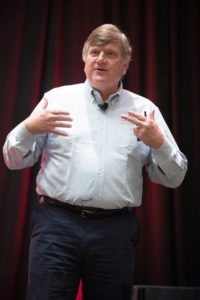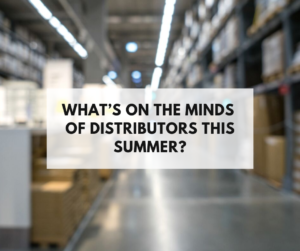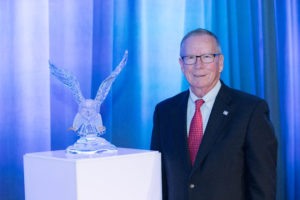Dr. Barry Lawrence, Texas A&M-NetPlus Alliance Small Distributor Consortium
NetPlus Alliance recently wrapped its first year of its partnership with Texas A&M University for the Small Distributor Consortium. We’ve once again partnered with Texas A&M in 2019, kicking off round two in February.
The goal of the consortium is to learn best practices from the companies within our industry that are successful, and to share those with the NetPlus Alliance buying group members to support their long-term growth. Participating distributors’ locations are visited by Texas A&M researchers, who then provide recommendations for impactful changes and tools to identify and prioritize which best practices make the most sense for their businesses.
Distributors that want to participate in 2019 can contact Kerry Atlas at 716-438-2014 or kerry.atlas@netplusalliance.com. The kickoff meeting is Feb. 18-19, 2019, at Texas A&M in College Station, Texas.
NetPlus Alliance recently spoke with Dr. Barry Lawrence about the importance of the consortium and the value it brings to small distributors.
NetPlus Alliance: Why is the Small Distributor Consortium important?
Dr. Barry Lawrence: Almost 25 years ago, we started to develop a knowledge base for wholesale distribution. At the time, there was no resource that was a “here is how you run a best-in-class distributor.” We did hundreds of projects with distributors around operational areas, and then we moved into sales and marketing. We developed a series of consortia on deep-dive topics for distributors and created a body of knowledge on how distributors operate. Through all of that time, even though we had done projects here and there with small distributors, the knowledge we had created spoke largely to the needs of large distributors.
Now, whether large or small, the principles are the same around financials, sales techniques, and warehousing and operations. But it’s important to understand when things become smaller, how the variables change. For example, you don’t have 10 employees in the warehouse, or sales forces with different specializations. You have different customer relationships. Most importantly, you usually have an individual, an owner, that has limited resources. So while the math was the same, nobody had explained it in the context of the small distributors’ environment. This gives us the ability to develop a large body of knowledge on small distributors.
To leave the small distributors out would be a big oversight. We wanted to make sure we covered it all, and we felt there was a real need to help this community.
NetPlus: How can this help the community of smaller independent distributors, to provide them with tools and the confidence that they need to compete in today’s fast-changing market?
BL: The simplistic approach says that certain best-practice activities or methodologies for communicating with customers can only be performed by those who have the resources to build a large system. But that simplistic view is not really how the world works. How the world works is that all businesses are complex environments where an investor is investing in those things that work to serve their customers. As their customers’ needs change, they change. It’s not a time to panic because the reality is, we've been going through this (change) now for over 20 years. It’s going to take a while for the smoke to clear. But as the smoke clears, your highly innovative niche players, which is what small distributors are, will be adapting their business throughout that process. When the smoke clears, they might look like an entirely different type of company. Or they may look very much the same. Or they may have a few more bells and whistles on them. The important point here is that if I'm going to get through the fog, then I've got to run my company efficiently so that my own inefficiencies don't stop me from adapting.
That's where our research becomes important. We want to understand what it means to efficiently run and invest in a small distributor.
NetPlus: What are the some of the differences in approaches between a large and smaller distributor when doing this research?
BL: Remember, for the small distributor, you've only got two big investments. One is their money; the other is their time. Where that owner focuses their attention is where the company is going to be driven. The first priority is what the distributor is already doing. Which is focusing on the solution that links them to the customer. They're not like the grocery store, which a large distributor might resemble. They're doing it one customer at a time. And they're shaping their operations along those lines. That is a big opportunity to bring in a more professional approach to things that can be done that way.
We must, as a research team, never lose sight of the fact that that specialized touch is what gave that distributor their existence and what continues it, sustains it. Then anything that you can then take into a more systemized approach that they have not had time to gain the knowledge to understand it, they can bring an approach that makes it more efficient, that's only going to make them stronger.
Learn more about the consortium and how NetPlus Alliance member C&C Supply benefited in this feature from Modern Distribution Management: NetPlus Alliance and Texas A&M Conduct Big Research on Small Distributors.





